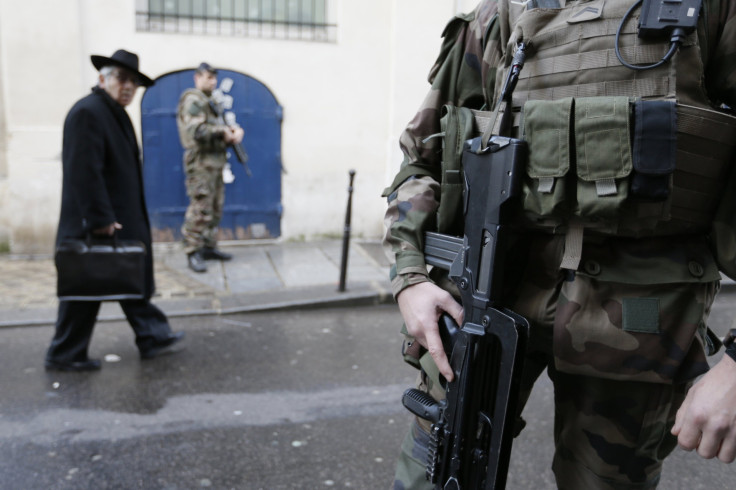France’s Online War On Terror Sympathizers And Extremists Has A New Cyber Security Cell

PARIS -- France has declared what some are calling a war on terror in the wake of the attacks on the Charlie Hebdo magazine and Hyper Cacher market, and a number of the battles are expected to be waged online. France announced policies to prevent both cyberterrorism attacks by Islamist hacking groups and online recruitment by extremist groups targeting French youth.
France created its first cybersecurity crisis cell this week to complement its already mobilized armed forces, Le Monde reported. The country has also doubled-down on an existing law that allows the shutdown of websites deemed to be “sympathizing with terror,” extending it to social-media posts -- evidenced most notably by the recent arrest of French comedian Dieudonne M’bala M’bala.
The French army’s new cybersecurity crisis cell was established because of recent, “unprecedented” breaches. Roughly a dozen officers are working out the army’s Center for Planning and Executing Operations, or CPCO, around the clock, Le Monde reported.
For now, the branch is focused on gathering and synthesizing information linked to Islamist extremists as well as ensuring the protection of the country’s defense systems, military personnel told Le Monde.
Sabrina, who asked her last name not be published, is a 28-year-old practicing Muslim who told International Business Times since the attack at the Charlie Hebdo office, she has had two Facebook posts removed, presumably by Facebook administrators. Both posts stated she was offended by the Charlie Hebdo cartoons mocking the Prophet Muhammad and expressed her refusal “to be Charlie.”
Sabrina said: “Even on Facebook, we can’t express ourselves. I wrote what I thought. It wasn’t an insult. Now I refuse to speak because I’m afraid.”
The online crackdown stems from the belief the Internet plays a role in sparking radical thinking in France and is partially responsible for what Parisians call “bourrage de crane,” which literally translates to “stuffing the skull” -- brainwashing. Interior Minister Bernard Cazeneuve warned this week about “social networks, used for recruitment more than ever, as points of contact and for the acquisition of techniques necessary to carry out an act.”
“It puts something in their head. It replaces the culture they have with another,” painter Thomas Bouzanquet, 24, said. “This fascist ideology. ... It’s brainwashing and takes precedence over their culture and education.”
The swift rise of the Islamic State group in Iraq and Syria was in part achieved because of its voracious social-media campaign, used for both recruitment and a tsunamilike dissemination of its propaganda. Since then, al Qaeda in the Arabian Peninsula, or AQAP, has stepped up its own online presence to maintain its position in the terrorist group hierarchy. AQAP claimed responsibility for the attack at Charlie Hebdo while the Hyper Cacher gunman reportedly pledged allegiance to the militant group formerly known as either ISIL or ISIS.
“There are kids who are very educated. It’s Internet, Facebook,” said Saida Elaroy, an employee at Korcarz Bakery in Paris’ Jewish quarter who was born in Morocco. “It puts ideas into their head. When a kid is 17 or 18 years old, the mom is supposed to sit behind him and monitor what he’s doing all the time. She can’t!”
However, online jihadist sympathizers in France are not unique to the rise of the Islamic State group. French national Romain Letellier was arrested for running al Qaeda-linked French-language forum Ansar al-Haqq (Supporters of Truth). The website had been active for several years before Letellier’s arrest and even had several posts about Charlie Hebdo from 2010, IBTimes found. The hacktivist group Anonymous claimed this week it took the website offline.
Despite the efforts of Anonymous and the army’s initiative, a group of hackers who call themselves the United Islamic Cyber Force continue to claim breaches of French websites. The group claimed on its Twitter account Saturday to have taken at least four websites with .fr domains offline, including a French jiu-jitsu website and another titled the French Federation Of BasketBall.
Several of France’s largest French-language news outlets were taken offline Friday. That followed a report from Zataz.com of 19,000 “hostile” situations on French websites after the attack at Charlie Hebdo. In the past week, the websites of some French municipalities also reportedly were taken down and replaced with a flag similar to the one used by the Islamic State group. The United Islamic Cyber Force claimed responsibility for the attack on its Twitter account.
© Copyright IBTimes 2024. All rights reserved.






















